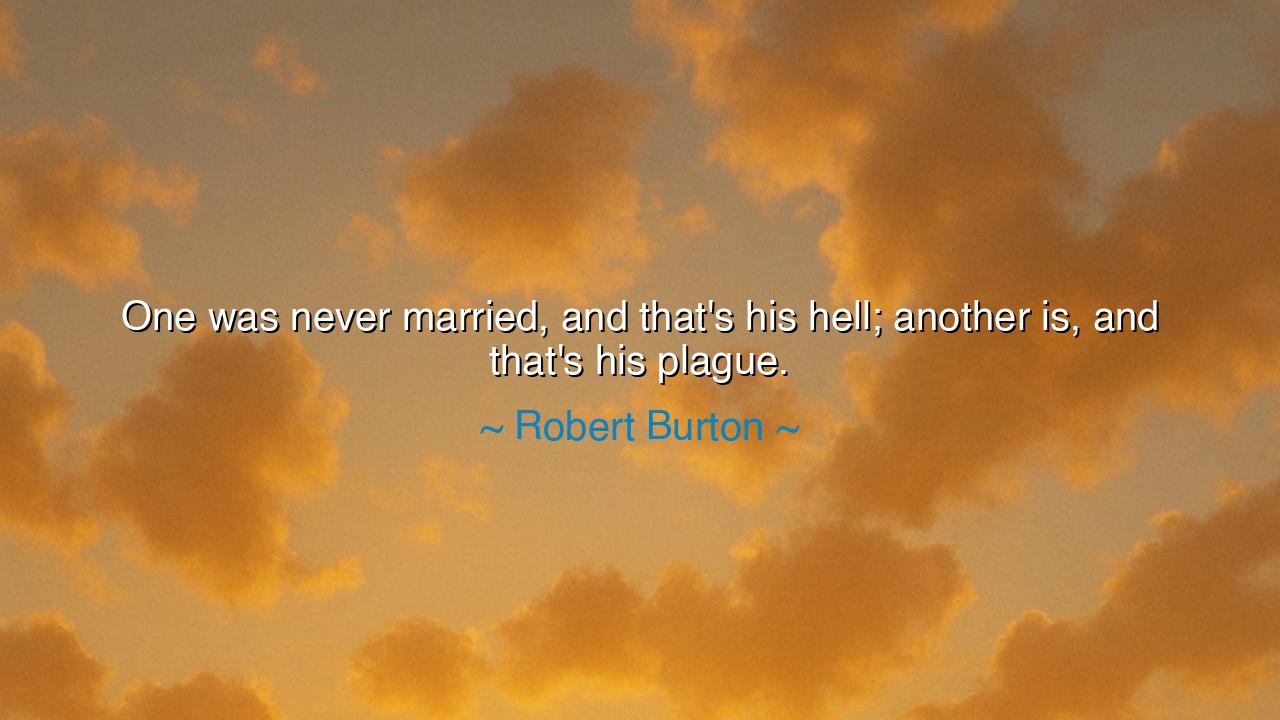
One was never married, and that's his hell; another is, and






The words of Robert Burton—“One was never married, and that’s his hell; another is, and that’s his plague.”—flow with the dark humor and melancholic insight of a man who understood the dual nature of human longing. Written in the seventeenth century, in his monumental work The Anatomy of Melancholy, these words pierce like a mirror reflecting the soul’s eternal restlessness. In them, Burton captures a paradox that has haunted humankind since time immemorial: that solitude and union, though opposites, are bound by the same thread of discontent. The one who is single yearns for love’s warmth; the one who is bound in marriage longs for freedom’s quiet. Thus, he speaks not to cynicism, but to the tragic humor of human nature—our tendency to find both our joy and our torment in the same place.
The origin of this quote lies in Burton’s lifelong fascination with the ailments of the human spirit. In The Anatomy of Melancholy (1621), he sought to understand the causes of sorrow, not through medicine alone, but through philosophy, poetry, and theology. His book was a vast meditation on what it means to be human—our loves, our fears, our follies. When he turned his gaze to the subject of marriage, he did so with both compassion and irony. He observed that marriage, though a divine institution, is also a source of endless vexation; yet celibacy, though seemingly peaceful, breeds its own misery in loneliness and desire unfulfilled. Hence his jest: the single man is condemned to hell for want of love, while the married man endures a plague for having found it.
In these words, Burton reveals not despair, but wisdom born of balance. He reminds us that life offers no perfect condition; every choice bears its shadow. The one who remains single must face the long nights of solitude, the silence that echoes too loudly in an empty home. But the one who marries must learn the art of endurance—the patience to weather another’s moods, the humility to yield, and the grace to forgive. Both paths, though different, demand courage. Burton’s wit is but a veil for a deeper truth: that the measure of a life is not found in its comfort, but in how one bears its contradictions.
History offers many examples of this paradox. Consider the tale of Socrates, who, though wed to the famously ill-tempered Xanthippe, once said that marriage was necessary—if a man found a good wife, he would be happy; if a bad one, he would become a philosopher. His jest, much like Burton’s, conceals a profound truth: that suffering, whether from solitude or companionship, can lead to wisdom. Socrates did not curse his marriage; he used it as a forge for patience and self-knowledge. In this, he stands as proof that adversity in love, when faced with humor and grace, becomes a teacher rather than a tormentor.
Burton’s reflection also speaks to the eternal dissatisfaction of the human heart. We imagine happiness always in the opposite of what we have. The single envies the warmth of family life, while the married longs for the quiet freedom of solitude. Yet neither state is wholly heaven or hell—they are but different classrooms in the same school of the soul. The wise learn that peace does not come from changing one’s circumstance, but from changing one’s heart. It is not the marriage that plagues, but the pride that refuses to yield; not solitude that damns, but the fear of being alone with one’s own thoughts. Thus, Burton’s jest becomes a mirror of the spirit’s restlessness, urging us to look inward rather than outward for contentment.
But there is also tenderness in his irony. For in truth, both solitude and union are sacred callings. The one who walks alone learns independence, self-reliance, and quiet faith. The one who binds himself in love learns humility, service, and endurance. To despise either state is to despise the lessons of life itself. Burton, though sardonic, reminds us that every human condition bears both pain and promise, and the wise accept both without complaint. In laughter, he teaches patience; in paradox, he teaches acceptance.
So, my child, remember this ancient truth: no life is free from burden, no heart free from longing. Whether you walk alone or with another, do so with grace. If you are single, use solitude as a garden to cultivate your soul; if you are married, use companionship as a mirror to refine your spirit. Do not seek perfection in love, for love itself is the school of imperfection. As Burton’s wit whispers through the centuries, it is not the state of our life that determines our peace, but the wisdom with which we bear it. In laughter, we find our balance; in acceptance, we find our joy. For whether in hell or plague, the soul that chooses gratitude transforms both into blessings.






AAdministratorAdministrator
Welcome, honored guests. Please leave a comment, we will respond soon